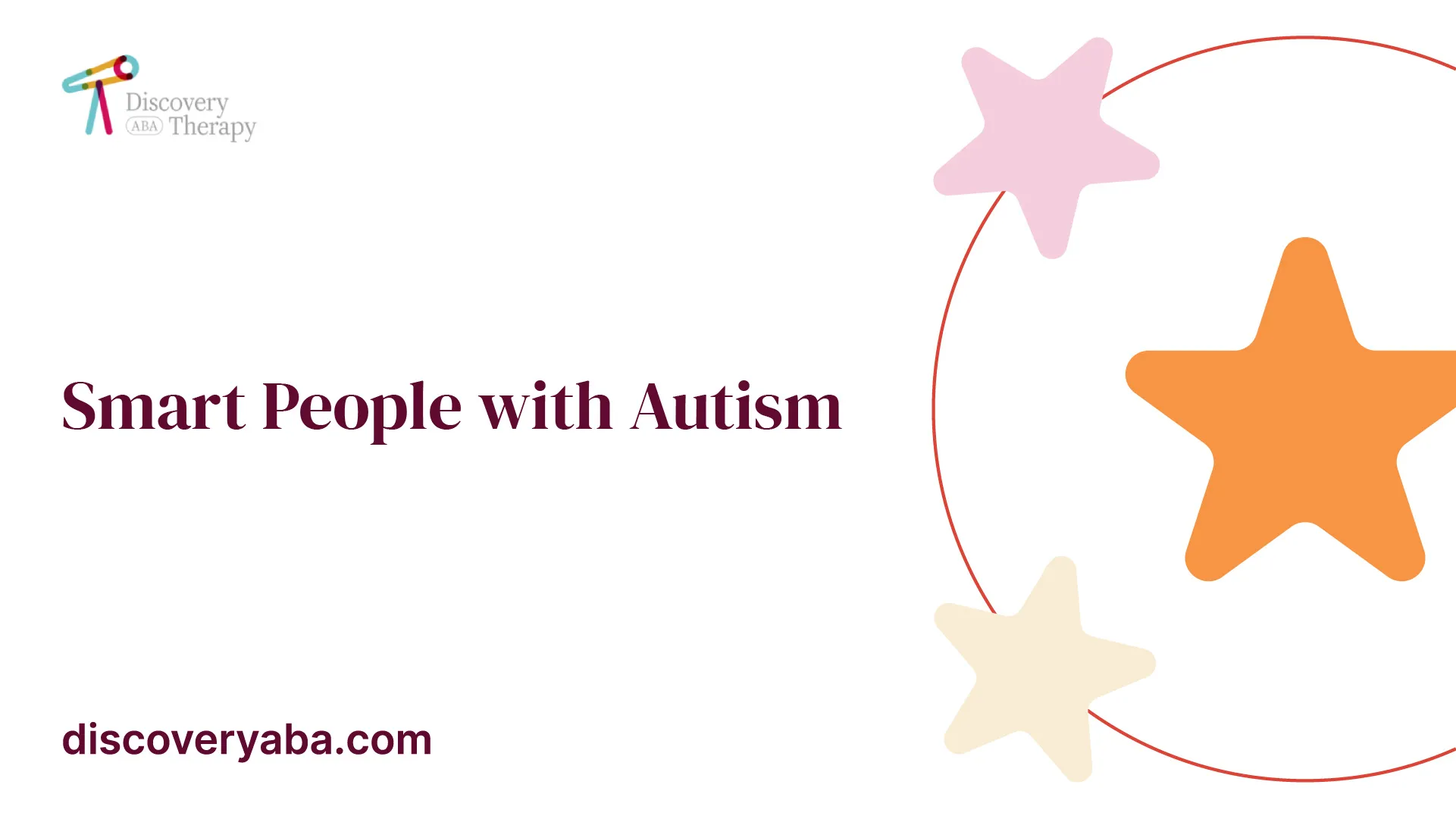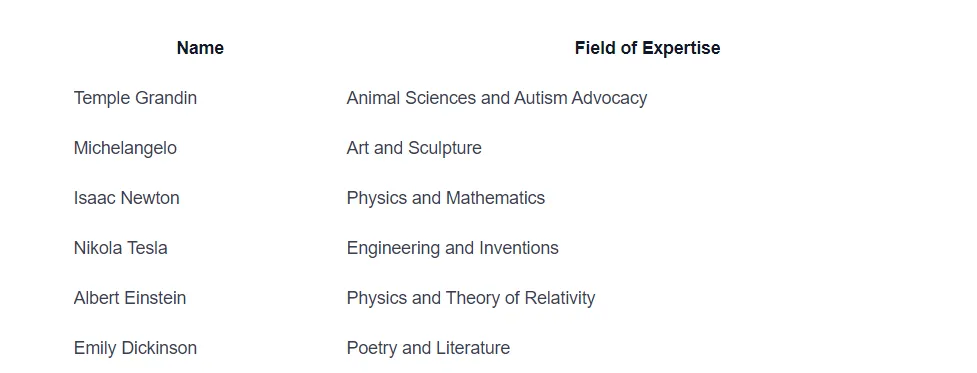Smart People with Autism
Discover the brilliance of autism! Uncover the exceptional cognitive abilities and success stories of smart people with autism.

Understanding Autism Spectrum Disorder (ASD)
Autism Spectrum Disorder (ASD) is a neurodevelopmental disorder characterized by difficulties in social interaction, communication, and repetitive patterns of behavior. Individuals with ASD may have restricted interests, struggle with social interactions, and have a limited extent of sharing their thoughts and feelings with others. It's important to note that ASD is a spectrum, meaning that individuals with this condition can experience a wide range of abilities and challenges.
What is Autism Spectrum Disorder?
Autism Spectrum Disorder, often referred to as ASD, is a neurodevelopmental disorder that affects how individuals perceive and interact with the world around them. It is characterized by differences in social communication and interaction, as well as the presence of restricted, repetitive patterns of behavior, interests, or activities.
ASD is typically diagnosed in early childhood, although some individuals may receive a diagnosis later in life. It is a lifelong condition that affects people across all races, ethnicities, and socioeconomic backgrounds.

Common Characteristics of ASD
While ASD is a complex condition with diverse presentations, there are several common characteristics often associated with the disorder. These may include:
- Challenges in social interactions: Individuals with ASD may have difficulty understanding social cues, nonverbal communication, and developing meaningful relationships. They may struggle with initiating or maintaining conversations and may prefer solitary activities.
- Restricted interests and repetitive behaviors: People with ASD often display intense interests in specific topics or objects. They may engage in repetitive behaviors, such as hand-flapping, rocking, or lining up objects. These behaviors can provide comfort and help regulate sensory input.
- Sensory sensitivities: Many individuals with ASD have heightened or diminished sensitivity to sensory stimuli, such as sound, light, touch, or taste. This can lead to sensory overload or a need for specific sensory input to feel regulated.
- Communication differences: Some individuals with ASD may have delays or difficulties in speech and language development. Others may have a rich vocabulary but struggle with pragmatic language skills, such as understanding and appropriately using non-literal language or understanding social context.
- Executive functioning challenges: People with ASD may experience difficulties with executive functioning skills, such as planning, organizing, and problem-solving. They may have trouble with transitions, flexibility, and managing their time.
It's important to recognize that every individual with ASD is unique, and the presentation of these characteristics can vary widely. Embracing neurodiversity means celebrating the diversity of individuals with ASD and recognizing their unique strengths and abilities.
The Unique Intelligence of Individuals with ASD
Autism Spectrum Disorder (ASD) is often associated with exceptional cognitive abilities. Individuals with ASD possess unique strengths that set them apart in terms of intelligence and cognitive functioning. Let's explore the exceptional cognitive abilities seen in individuals with ASD and some notable autistic geniuses throughout history.
Exceptional Cognitive Abilities in Autism
Autistic individuals often demonstrate remarkable cognitive strengths, including strong memory, problem-solving skills, and intense focus. Their unique perspectives and skills have led to extraordinary achievements in various fields such as art, music, and writing. Their exceptional cognitive abilities allow them to approach tasks and challenges in unconventional ways, providing fresh insights and innovative solutions.
These abilities are particularly evident in areas that require attention to detail, pattern recognition skills, and logical thinking. Autistic individuals often excel in careers that demand precision and accuracy, such as scientific research, technological advancements, and computer programming.
Autistic Geniuses Throughout History
Throughout history, autistic individuals have made significant contributions in various fields, leaving a lasting impact on society. Some well-known autistic geniuses include:

These individuals, among many others, have demonstrated the exceptional cognitive abilities and unique perspectives associated with autism. Their achievements highlight the immense talent and intellectual capabilities present within the autistic community.
By recognizing and celebrating the unique intelligence of individuals with ASD, we can foster a more inclusive society that values diversity and appreciates the contributions of all individuals, regardless of their neurodiversity.
Cognitive Functioning in Autism
Individuals with Autism Spectrum Disorder (ASD) often experience cognitive impairment, which is among the most challenging characteristics of the condition. While ASD is a common neurodevelopmental disorder, diagnosing and treating cognitive impairment in ASD still poses significant difficulties.
Cognitive Impairment in ASD
There are no specific diagnostic criteria for cognitive impairment in ASD, making it even more complex to assess. The leading causes of cognitive impairment in individuals with ASD can be attributed to neurological, immune, and gastrointestinal dysfunction. Immune dysfunction, for instance, can result in neuroinflammation, affecting neural connectivity, the balance of neurotransmitters like glutamate and gamma-aminobutyric acid (GABA), and brain plasticity.
Cognitive dysfunction is not universally associated with all individuals on the autism spectrum. However, it is often mistaken for other intellectual disabilities or attention deficit hyperactivity disorder (ADHD). Parents usually notice the behavioral characteristics and cognitive functions as the first signs that prompt them to seek medical attention for their child.
Cognitive functions rely on optimal arousal and attention, as well as sensory perception (visual, auditory, and tactile), to perceive and react to changes in the environment. Any breakdown in sensory perception and integration can impact behavior, emotions, and cognition.
Challenges and Misconceptions
The cognitive functioning of individuals with ASD is diverse, and it is essential to recognize that not all individuals with ASD experience cognitive impairment. However, due to the overlap of symptoms with other neurodevelopmental disorders, cognitive impairment in ASD is often misunderstood or misattributed.
Moreover, cognitive reserve, which determines cognitive performance in older age, may be dysfunctional in older individuals with ASD. There is ongoing research regarding age-related dementia in ASD, with conflicting findings. Some studies suggest that hyperplasticity occurs in the anatomically large white matter in individuals with ASD, potentially providing a protective barrier against age-related dementia. However, more comprehensive and large-scale research is necessary to fully understand this relationship.
Understanding the cognitive functioning of individuals with ASD is crucial for providing appropriate support and intervention strategies. By recognizing and addressing cognitive challenges effectively, we can help individuals with ASD reach their full potential and enhance their overall quality of life.
The Link Between Autism and High Intelligence
Autism Spectrum Disorder (ASD) is often associated with exceptional cognitive abilities and high intelligence levels. Research has shown a positive genetic correlation between autism genes and measures of mental ability, indicating a connection between autism and high IQ. Let's explore the link between autism and high intelligence further.
Genetic Correlation and Mental Ability
Studies have found that alleles for autism broadly overlap with alleles for high intelligence. Carrying genetic variants linked to autism is associated with slightly better test scores on average. This suggests that there is a positive genetic correlation between autism and mental ability.
Enhanced Cognitive Skills in Autism
Autistic individuals often exhibit unique cognitive strengths and characteristics. They may excel in specific cognitive tasks, such as performing well in Raven's Matrices, an intelligence test that involves using analytical skills to complete visual patterns. Research indicates enhanced visual processing in individuals with autism, contributing to their performance in such tests.
It's important to note that while many individuals with autism demonstrate high intelligence levels, it does not necessarily mean that all individuals with autism are geniuses. Autism is a spectrum, and cognitive abilities can vary among individuals. However, the observation that many autistic individuals, as well as neurotypicals with autistic genes, exhibit average to above-average intelligence levels, highlights the presence of enhanced cognitive skills in autism.
Understanding the link between autism and high intelligence can help promote a more inclusive and appreciative perspective towards individuals on the autism spectrum. Recognizing and nurturing the unique cognitive strengths of individuals with autism can lead to a more inclusive society that values and celebrates neurodiversity.
Success Stories of Autistic Individuals
Autism Spectrum Disorder (ASD) does not limit one's potential for success. Many individuals with ASD have made significant contributions to various fields, showcasing their exceptional abilities and unique perspectives. Here, we delve into the achievements and contributions of famous people with Autism Spectrum Disorder.
Famous People with Autism Spectrum Disorder
Several well-known figures are believed to have had Autism Spectrum Disorder. While not formally diagnosed, their characteristics and accomplishments align with the traits commonly associated with ASD. Let's explore some of these individuals:

Achievements and Contributions
Individuals with Autism Spectrum Disorder often possess exceptional talents and abilities that contribute to their success. Some factors that can contribute to their achievements include:
- Restricted Interests: People with ASD may have intense and focused interests, allowing them to excel in specific areas [1]. This dedication and passion contribute to their remarkable accomplishments.
- Social Interaction: While individuals with ASD may experience challenges in social interactions, having a few close and supportive friends who share similar interests can positively impact their well-being [1]. The ability to focus on their goals and have alone time can help maintain clarity and focus.
Let's explore some examples of notable achievements by individuals believed to have had Autism Spectrum Disorder:
- Elon Musk: Co-founder of The Boring Company, Neuralink, SpaceX, and Tesla, Elon Musk announced he has Asperger's during his monologue, aligning him with the autistic genius category.
- Albert Einstein: Although not formally diagnosed, Einstein's difficulties with small talk and intense focus on his work have led many to believe he had Asperger's. Despite these challenges, he won the Nobel Prize in Physics for his Theory of Relativity.
- Isaac Newton: Credited for leading the Scientific Revolution and discovering the laws of gravity, Newton immersed himself in his work and was known for his withdrawn nature, which aligns with characteristics of autism.
- Charles Darwin: Renowned for his publication "On the Origin of Species," Darwin's passion for his work, combined with social withdrawal, has led experts to believe he had autism.
- Amadeus Mozart: Mozart, who started composing music at the age of 5 and had impulsivity challenges, is now believed by experts to have been on the autism spectrum.
The achievements and contributions of these individuals highlight the immense potential and brilliance that individuals with Autism Spectrum Disorder possess. By embracing neurodiversity and valuing different perspectives, we can create an inclusive society that celebrates the unique talents and strengths of all individuals.
Nurturing the Potential of Individuals with ASD
To fully support and nurture the potential of individuals with Autism Spectrum Disorder (ASD), it is crucial to create environments that are understanding, inclusive, and provide opportunities for growth. Two key aspects in nurturing the potential of individuals with ASD are supportive environments and customized learning approaches.
Supportive Environments and Opportunities
Creating supportive environments is essential for individuals with ASD to thrive and reach their full potential. These environments should be understanding and accommodating of their unique needs, providing the necessary support and resources. Some ways to create supportive environments for individuals with ASD include:
- Education: Schools and educational institutions should have specialized programs, trained teachers, and support services tailored to the needs of individuals with ASD. This includes providing individualized education plans, assistive technologies, and sensory-friendly classrooms.
- Workplace: Employers can create inclusive workplaces by implementing reasonable accommodations, such as flexible work schedules, clear communication channels, and providing support through job coaches or mentors. Embracing neurodiversity in the workplace not only benefits individuals with ASD but also promotes innovation and diversity.
- Community: Community organizations and support groups play a vital role in providing a sense of belonging and support for individuals with ASD and their families. These organizations can organize social events, recreational activities, and peer support groups to foster social connections and friendships.
By providing supportive environments, individuals with ASD can feel valued and empowered, enabling them to showcase their unique talents and abilities.
Customized Learning Approaches
Customized learning approaches are crucial for individuals with ASD to maximize their potential. While traditional teaching methods may not always be the most effective for individuals with ASD, customized approaches take into account their strengths and challenges. Some key considerations for customized learning approaches include:
- Visual Learning: Many individuals with ASD have relative strengths in visual processing abilities compared to verbal (language) abilities. Customized learning approaches often utilize visual supports, such as visual schedules, pictorial instructions, and visual aids, to enhance learning and comprehension.
- Individualized Education Plans (IEPs): IEPs are tailored plans that outline specific goals and accommodations for students with special needs, including those with ASD. These plans consider the unique strengths and challenges of each student, allowing for personalized learning experiences.
- Neuropsychological Assessments: Neuropsychological assessments can help identify the cognitive strengths and weaknesses of individuals with ASD. These assessments can guide educators in developing appropriate strategies and interventions that capitalize on the strengths of the individual.
- Early Intervention Programs: Intensive early intervention programs for toddlers and preschoolers with autism have shown promise in lessening the severity of language and intellectual delays. These programs focus on early identification, individualized interventions, and family support, leading to improvements in intelligence and language skills.
Customized learning approaches ensure that individuals with ASD receive the support and accommodations they need to excel academically and reach their full potential.
By fostering supportive environments and implementing customized learning approaches, we can unlock the brilliance and unique abilities of individuals with ASD. Through these efforts, we can celebrate their achievements, promote inclusivity, and embrace the power of neurodiversity.
The Power of Neurodiversity
Neurodiversity refers to the idea that neurological differences, such as those associated with autism spectrum disorder (ASD), should be recognized and valued as a natural variation of the human experience. This perspective emphasizes the importance of appreciating the unique perspectives and strengths that individuals with autism bring to society.
Valuing Different Perspectives
Autistic individuals possess a unique way of viewing the world, often characterized by a heightened sensitivity to sensory experiences. This perspective can lead to extraordinary achievements in various fields, including art, music, and writing. By valuing and embracing these different perspectives, we can gain a deeper understanding of the world and foster a more inclusive society.
Leveraging Strengths for Success
Autistic individuals often excel in areas that require attention to detail, pattern recognition skills, and logical thinking. Their strengths make them valuable contributors to scientific research, technological advancements, and other fields where precision and accuracy are crucial [2]. Research indicates a positive genetic correlation between autism genes and measures of mental ability, suggesting that autism is a "disorder of high intelligence" [2].
Autistic individuals often possess exceptional cognitive abilities, such as strong memory, problem-solving skills, and intense focus. These skills have led to extraordinary achievements in areas such as art, music, and writing. For example, a study found that autistic individuals performed well in the Raven's Matrices intelligence test, which assesses analytical skills and the ability to complete ongoing visual patterns.
By leveraging the strengths of individuals with autism, we can create opportunities for them to thrive and contribute to society. Customized learning approaches and supportive environments that recognize and cater to their unique strengths can play a crucial role in nurturing their potential. When we embrace neurodiversity and provide equal opportunities for individuals with autism, we unlock a wealth of talent and innovation that benefits us all.
References
- [1]: https://behavioral-innovations.com/blog/20-famous-people-with-autism-spectrum-disorder-asd/
- [2]: https://www.yellowbusaba.com/post/smart-people-with-autism
- [3]: https://www.ncbi.nlm.nih.gov/pmc/articles/PMC10557542/
- [4]: https://hiddentalentsaba.com/geniuses-with-autism/
- [5]: https://www.kennedykrieger.org/stories/interactive-autism-network-ian/measuring-iq-autism
Does Your Child Have An Autism Diagnosis?
Learn More About How ABA Therapy Can Help
Find More Articles
Contact us
North Carolina, Nevada, Utah, Virginia
New Hampshire, Maine
Arizona, Colorado, Georgia, New Mexico, Oklahoma, Texas
.avif)




































































































